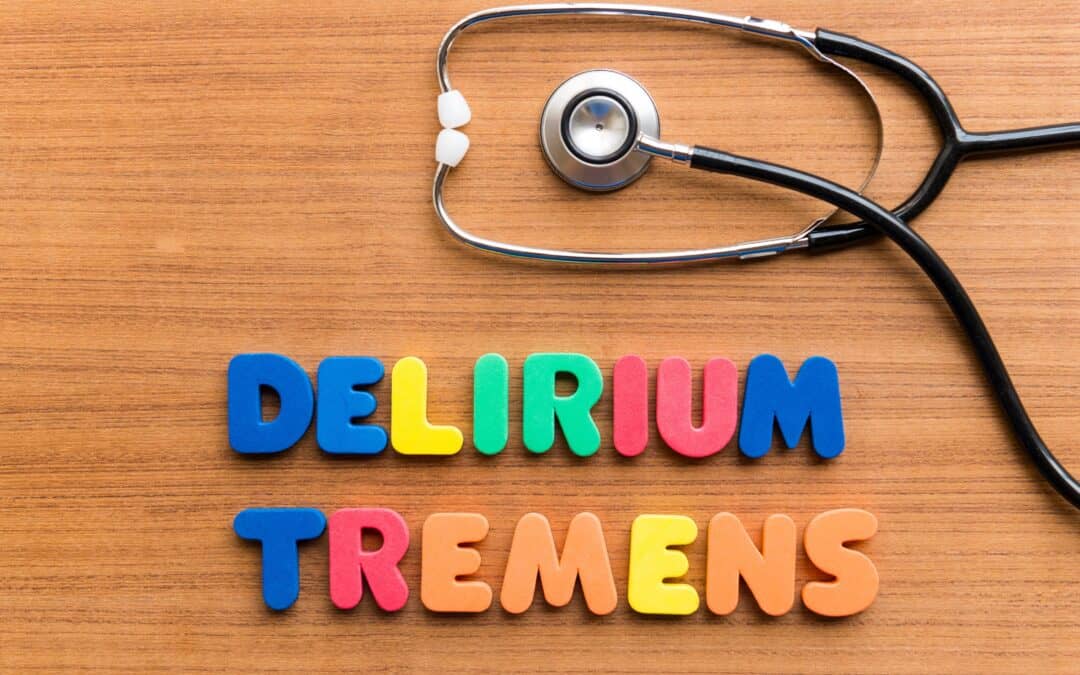The National Institute on Alcohol Abuse and Alcoholism reports in 2021 just over 29 million people ages 12 and older had an alcohol use disorder. Delirium tremens are among the most significant health risks associated with alcohol withdrawal symptoms during detox.
Delirium tremens involve sudden mental and nervous system changes once an individual stops consuming alcohol after a lengthy alcohol use disorder. As a result, detox from an alcohol use disorder needs to include a medically-monitored detox and the possibility of medication-assisted treatment.
Defining Delirium Tremens
Merriam-Webster defines delirium tremens (DT) as “a violent delirium with tremors induced by excessive and prolonged use of alcoholic liquors.” However, delirium tremens is typically known as a severe withdrawal symptom during a detox from alcohol addiction. Withdrawal from alcohol can be life-threatening. Only 5% of those detoxing from alcohol addiction experience this symptom; a quarter of people who experience delirium tremens die.
When tolerance of alcohol transfers to dependence, the brain’s chemistry continues to change and adapt to continued alcohol use, so the user needs more alcohol to achieve the same effect. Sometimes, those who anticipate detox drink more alcohol before it begins, due to nervousness. When this happens, the user is at a greater risk of developing delirium tremens.
Other risk factors for developing extreme withdrawal symptoms are any of the following:
- Previous episodes of alcohol withdrawal
- Previous experience with the DTs or withdrawal seizures
- Significant underlying physical health issues such as injury, liver or heart disease, or traumatic brain injury
- Being of an older age
- On other medications or supplements
- Diagnosed mental health or psychiatric disorder
- Poor general health, including poor diet
- Those who have been abusing alcohol for over 10 years
Signs Someone Is Experiencing Delirium Tremens
Detoxification from alcohol addiction must include a medically monitored team with a plan to monitor the patient 24 hours a day until the process ends. Alcohol withdrawal has many symptoms, but delirium tremens do not appear immediately but progress over time.
As the patient withdraws from alcohol, the entire body is affected, including all the major body organs and the brain. Therefore, experienced treatment professionals must be with the patient and the medical staff to monitor the progression, the intensity of the symptoms, and any alarming physical signs.
Progressive signs and symptoms involving delirium tremens could include any of the following:
- A sense of confusion
- Development of agitation, irritability, or aggression
- Extreme anxiety
- Trembling, sweating, tachycardia, nausea, vomiting, or any severe autonomic hyperactivity
- Hallucinations: either visual, tactile, or auditory
- Impairment of consciousness
- Tremors or seizures
What Happens during Delirium Tremens?
The progression in detox continues past the usual initial withdrawal symptoms, with some less-threatening signs. If seizures are already started, medical monitoring will determine the type of seizures. The most common type is generalized tonic-clonic hallucinations, leading to hallucinations, dizziness, violent muscle contractions, and loss of consciousness.
Delirium tremens less threatening symptoms can include any of the following symptoms.
- Sensitivities with light, sounds, and touch
- Feelings of excitement or fear
- Bursts of energy
- Sleepiness
- Extreme fatigue
In addition, these extreme and dangerous signs and symptoms can develop with delirium tremens:
- Delirium, or severe confusion
- Chest pains
- Nausea and vomiting
- Hallucinations: visual and auditory
- Fever
- Drastic fluctuations in mental function
Delirium Tremens Timeline
The essential understanding of detoxification and treatment for substance use disorders is that each journey is different. While detox and delirium tremens can follow a generalized timeline, each staff must supervise individual reactions and symptoms. The timeline will fluctuate with the ongoing process. Safe and medically monitored detox is always the best choice for detoxing from a substance use disorder.
A general estimate of a delirium tremens timeline:
- 6 to 24 hours after heavy and prolonged drinking ends, withdrawal symptoms will appear.
- 12 to 48 hours after the last drink, more severe symptoms will begin, such as hallucinations, seizures and can evolve into delirium tremens
- Once delirium tremens begins, this symptom can last 3 to 4 days, typically resolving after 5 days, but could continue up to 8 to10 days.
The Role of Detox and Treatment
Detoxification is a complex process with alcohol use disorders because of the possibility of delirium tremens. It is vital for safety and success in a complete detox for a medically-monitored detox program with the option of medication-assisted treatment to be available.
When looking for a treatment center with a detox program, ask about their detox programs for alcohol use disorders to be sure these options are available. When delirium tremens is a possibility, the following factors should be the main concerns of the detox program.
- Controlling agitation and aggressive behaviors
- Decreasing the risks of seizure
- Reduce the possibility of death
Medication-assisted treatment is often an aid for those with delirium tremens. For example, lorazepam and diazepam, both benzodiazepines, effectively relieve severe symptoms. Some may worry about using drugs to detox from alcohol, but delirium tremens is a severe withdrawal symptom that could quickly become a medical emergency.
During detox, the professionals want to avoid a trip to the hospital where the client could experience a stay in the ICU. As a result, it is imperative to enroll in a program with medically monitored detox with the possibility of medication-assisted treatment.
Treat Delirium Tremens in Tennessee
Find help understanding the detox process for an alcohol use disorder in Tennessee. Detox West Tennessee offers a medically monitored alcohol detox with the ability to use medication-assisted treatment. Our compassionate staff understands how much anxiety and fear those who are about to experience detoxification from alcohol can feel. We are very familiar with the possibility of delirium tremens and how to treat the symptom.
Contact us to get the care you deserve.


